The Friday Edition
Our Friday News Analysis | What the World Reads Now!
Helping to Heal a Broken Humanity (Part 61)
The Hague, 21 November 2025 | If you know of a decisive story, tell the world! We're still searching.

EDITORIAL | “The Best Way to Predict the Future is to Create It" (Part 25)
Click here for Part 1
Click here for Part 2
Click here for Part 3
Click here for Part 4
Click here for Part 5
Click here for Part 6
Click here for Part 7
Click here for Part 8
Click here for Part 9
Click here for Part 10
Click here for Part 11
Click here for Part 12
Click here for Part 13
Click here for Part 14
Click here for Part 15
Click here for Part 16
Click here for Part 17
Click here for Part 18
Click here for Part 19
Click here for Part 20
Click here for Part 21
Click here for Part 22
Click here for Part 23
EDITORIAL | Caught? With Hands in the Cookie Jar? Give Me a Break! They Knew It All Along.
By Abraham A. van Kempen
21 November 2025
You might wonder why I’m featuring ‘Bangladesh Court Sentences Former Prime Minister to Death’ as my first featured article.
The former prime minister, Sheikh Hasina, is guiltless compared to the EU-US/NATO Neocons (Neo-colonialists), who exploited the people of Ukraine as cannon fodder to fight Russia primarily on their behalf to the last Ukrainian, causing 1.8 million Ukrainians and 100,000 Russians to die for nothing, and playing Russian Roulette with the lives of the 700 million inhabitants in Europe, not withstanding those living in North America. In comparison to the Neo-colonialists’ ruthlessness, heartlessness, and callousness, the former prime minister of Bangladesh appears as an angel, an exemplar of virtue.
If you're not familiar with the Building the Bridge Foundation or have questions about the EU-US/NATO proxy conflict in Eurasia and its timing, check out our latest Friday News Analysis editions, starting by clicking on Part 23 (see above). Be sure to subscribe to receive these three-weekly updates—it's free. We're here to help clarify these complex topics.
The blame game has started. Mark my words. The EU-US/NATO Axis will drop its puppet, Vladimir Zelensky, like a hot potato. I predicted this scenario over two years ago. I’ve also written more than 200,000 words on the subject. Agreed! I don’t know everything, but I see a lot. I am Anglo-Dutch, born with dual nationality as a British and Dutch national.I’m at home in all of Eurasia, including the Middle East. My primary residence is in the United States. I know what’s going on.
Do you honestly believe the CIA, MI6, and MOSSAD knew nothing about Zelensky’s greed? I feel genuinely validated. Everything I’ve written has proven to be more true than false. It’s hard to be held accountable for stupidity. But when ignorance breeds arrogance, that’s a different matter. Many people choose ignorance. Just about all of my readers don’t. Thank you for being part of my world.
Enjoy your weekend.
Abraham A. van Kempen
Senior Editor
Building the Bridge Foundation, The Hague
A Way to Get to Know Each Other and the Other
PS. Last Thursday, I started the first of three or four final eye surgeries. I hope to be home for Christmas after an eight-month stay in Florida due to medical complications. I am optimistic.
Remember! Diplomacy is catalytic—transformative —while military action is cataclysmic—destructive and catastrophic.
When faced with the options to be good, bad, or ugly, let’s build bridges, not burn them. After all, mutual deterrence reigns.
BANGLADESH COURT SENTENCES FORMER PRIME MINISTER TO DEATH
Sheikh Hasina has been found guilty in absentia of ordering the use of deadly weapons against protesters in a popular uprising.
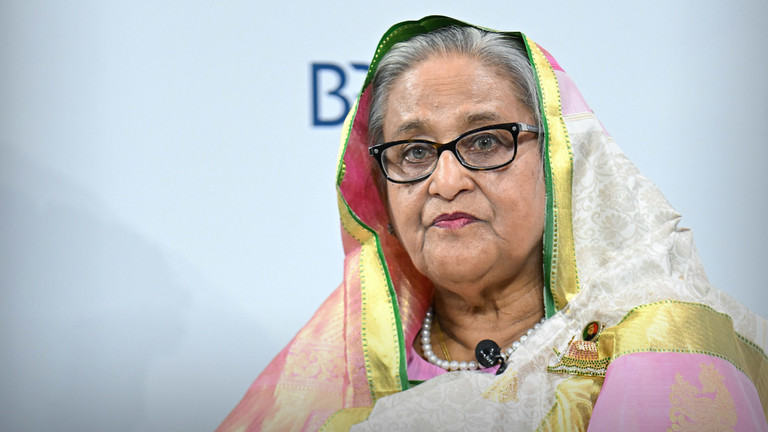
Sheikh Hasina © Tobias Hase / picture alliance via Getty Images
HomeWorld News
17 November 2025
Bangladesh’s International Crimes Tribunal (ICT) on Monday sentenced former prime minister Sheikh Hasina to death in absentia for crimes against humanity.
The verdict found her guilty of ordering a violent crackdown on protests last year, media reports say.
Hasina faces charges of murder, attempted murder, torture, and allegedly instructing the use of deadly weapons against protesters.
“The verdicts announced against me have been made by a rigged tribunal established and presided over by an unelected government with no democratic mandate. They are biased and politically motivated,” Hasina said in a statement.
Hasina, who fled to India after the 2024 uprising, said in a recent RT interview that the verdict was a “foregone conclusion.” She now lives in India.
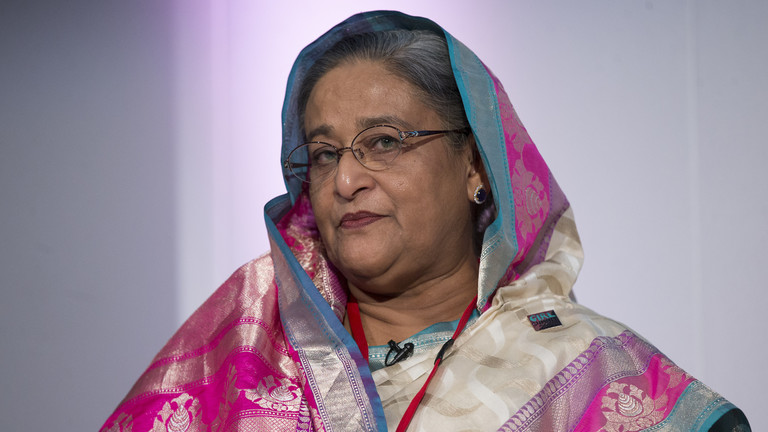
Read more
Bangladesh interim leader’s rhetoric threatens India ties – ex-PM Hasina
According to UN, up to 1,400 people died, mostly from security forces' gunfire during the crackdown. The protests ended after she left the country.
Others charged include ex-Interior Minister Asaduzzaman Khan Kamal and former police chief Chowdhury Abdullah Al-Mamun, who was the only accused in court.
The interim Bangladesh government's chief adviser is Nobel laureate Mohammad Yunus. Elections are scheduled for 2026. Hasina’s Awami League, in power for 15 years before the uprising, is barred from participating.
Hasina is the daughter of Bangladesh’s first president, Sheikh Mujibur Rahman, who was assassinated in the 1975 military coup.
Ahead of the verdict, hundreds of protesters marched to Dhanmondi 32, Rahman's former residence.
JOSÉ ANTONIO ZORILLA: POST-COLD WAR EUROPE - HOPE, HUBRIS & DELUSION
- Prof. Diesen’s conversation with Spanish Ambassador Zorilla reflects on the concerning shift in European politics and military strategy, particularly highlighting the rhetoric and actions surrounding the conflict involving Ukraine and Russia.
- The speakers compare current events and language to historical moments from World War II, expressing alarm at the normalization of aggressive stances and the loss of strategic direction in Europe.
- The discussion concludes with mutual appreciation and an invitation for further dialogue on these pressing issues.

Watch the Video Here (47 minutes, 44 seconds)
Host Prof. Glenn Diesen
Substack.com
16 November 2025
Reflections on the Evolution of European Politics and Security Strategy
Welcome back. Today, we welcome Jose Antonio Sorilla, a seasoned Spanish ambassador with global postings. He's also a prolific writer and speaker, providing insights into European politics and security.
From Post-Cold War Optimism to Strategic Uncertainty
The discussion starts with European politics since the 1990s. Ambassador Sorilla recalls beginning as a junior diplomat at the Helsinki Conference, witnessing the end of the Cold War and the rise of pan-European security ideas. Early optimism from Germany's Ostpolitik and reconciliation faded after the Soviet Union's collapse, leading to new geopolitical competition.
NATO Expansion and Its Consequences
Sorilla criticizes post-Soviet decisions for failing to seize opportunities to integrate Russia into the West. NATO expanded despite experts like Kennan warning it could harm Russia by undermining democracy and boosting nationalism. The ambassador notes that revolutions in Eastern Europe and tensions in Ukraine broke security agreements, leading to conflict.
The Hegemonic Dilemma and Economic Fallout
The ambassador emphasizes the U.S.'s leadership in global trade and military spending, but warns that it's unsustainable and strains Europe. Dependence on Russian energy causes economic issues for U.S.-aligned European countries. He notes Germany's move from peaceful industry to military production fuels regional instability.
Pan-European Security and the Minsk Moment
The Helsinki framework, once a key pillar of European security, is now outdated. Sorilla marks the Minsk conference as a turning point, shifting focus from Europe to Eurasia. With the U.S. less interested in a European system, institutions like the CIS and CSTO expand in the East, but the ambassador finds this inadequate.
NATO's Role and Perceptions of Security
The ambassador questions NATO expansion and the stabilization of Europe, and asks whether Russia will accept NATO nearby. He compares this to U.S. reactions to threats close to its borders, citing Ryurikov, Yeltsin's Security Advisor, who warned of American overconfidence leading to errors. The ambassador warns that supporting U.S. policies doesn't mean moral superiority, regardless of the consequences.
America, China, and the Security Paradigm
Sorilla contrasts China's discipline with the US military-industrial influence, arguing American foreign policy is driven by a small elite that maintains a cycle of war. This explains Europe's pressure to boost military spending and the ongoing conflict idea.
Europe's Strategic Subordination
The conversation highlights Europe's decreasing independence. Despite Macron's calls for strategic autonomy, recent events show Europe aligning more with U.S. interests. Sorilla criticizes Europe's diminished leadership and the rising influence of Poland and the Baltic states, driven more by hostility than strategy.
The Politics of Guilt and Germany's Role
The ambassador analyzes political guilt, especially regarding Germany, distinguishing it from moral guilt. He says political guilt is often used to control states and maintain dependency instead of true reconciliation. Sorilla claims that as long as Germany bears this guilt, European efforts will be limited.
The Strategic Vacuum in Europe
The discussion highlights a lack of a clear strategy in modern European politics. While past EU efforts involved setting goals and using economic strength, current leaders mainly offer slogans. The fundamental aims, such as “defeating Russia,” remain vague and undefined.
Concluding Reflections
Both speakers voice concern over Europe's strategic drift and the normalization of aggressive rhetoric and actions. The ambassador highlights problematic alliances and the resurgence of divisive historical narratives. The discussion ends with mutual appreciation, an invitation to continue dialogue, and a call for renewed clarity and purpose in European affairs.
This analysis reveals the complex interaction of external pressures and internal constraints in Europe’s strategy. The central theme is rising uncertainty, as new geopolitical realities challenge alliances and norms. As Europe adapts, thoughtful leadership and a clear, long-term strategy become vital.
GUEST EDITORIAL | BEHIND THE UKRANIAN GOLDEN TOILET: THERE’S ONLY ONE WAY TO FIX THE DISEASE OF THIS STATE
Kiev’s corruption machine will roll on – with or without Zelensky.

RT composite. © Telegram/NABU; Yaroslav Zheleznyak's social networks
By Andrey Rudenko
VGTRK reporter
HomeRussia & FSU
17 November 2025
The West’s distancing from Zelensky is apparent, unfolding like a steamroller. The Financial Times, normally not Kremlin-sympathetic, published ‘Bags of cash and a gold toilet: the corruption crisis engulfing Zelenskyy’s government’. It says Ukrainian elites expect more NABU probe revelations. When outlets like FT publish such reports, it usually signals behind-the-scenes preparations.
The approval of aid by Western Europe and the U.S. reveals bureaucratic inertia and interests that benefit from the war, not genuine confidence in Kiev. In Brussels, doubts are rising about sending billions to a government that may embezzle the funds before they arrive. These aren’t new revelations; the surprise is that anyone was shocked.
The West knew Ukraine's true situation. No one in Washington or Brussels thought Ukraine was as stable as Switzerland. They deliberately allied with a corrupt and unstable country, and pretending otherwise is just performative.
Ukrainian statehood has relied on unstable foundations for over thirty years: rival clans, oligarch-controlled governance, privatized security agencies, and a political class ready to exploit its own people. Changing presidents hasn’t shifted this core structure because all leaders depend on the same networks of money, patronage, and power.
Leonid Kravchuk's tenure saw Ukraine's gradual 'Banderization,' with state assets diverted and local power brokers gaining control. Leonid Kuchma refined this system, marked by questionable arms deals, murders of journalists and opposition figures, and recordings exposing orders to silence critics. Economic sectors with predictable profits were divided among regional clans, who governed their territories with loyalty and received kickbacks in Kiev.
Viktor Yushchenko’s era was marked by energy corruption, assassinations, and exploitation. Yanukovych and Poroshenko deepened this decay. Zelensky inherited and worsened it by surrounding himself with loyalists driven by personal gain and avoiding reform.
All these leaders prioritized opposing federalization at all costs, viewing a federal Ukraine as a threat because it would shift power and funds to regions, undermining Kiev’s control. This would weaken their influence over revenue, restrict their political power, and allow regional identities more freedom without central punishment. Instead of reform, they promoted forced Ukrainization, targeted the Russian language, and used nationalist slogans for political survival rather than nation-building.
Replacing presidents won’t fix underlying issues. Removing Zelensky just brings another figure from the same corrupt system, like Zaluzhny or a familiar face from the past. The pattern remains; only the masks change. The core problem is Ukraine's state structure. As long as Ukraine remains a unitary state, conflict, corruption, and unrest will continue. War isn't an anomaly but a natural outcome.
If elites resist reform and the people lack power, the debate must shift from individuals. The harsh reality is that the only lasting fix may be to abandon the current Ukrainian state model entirely. No superficial change can save a system designed to fail.
GUEST EDITORIAL | UKRAINE CORRUPTION: ZELENSKY’S WESTERN MASTERS HAD BETTER START LOOKING FOR A NEW PUPPET
The “Servant of the People” is only serving his besties, and patience with him is running out.
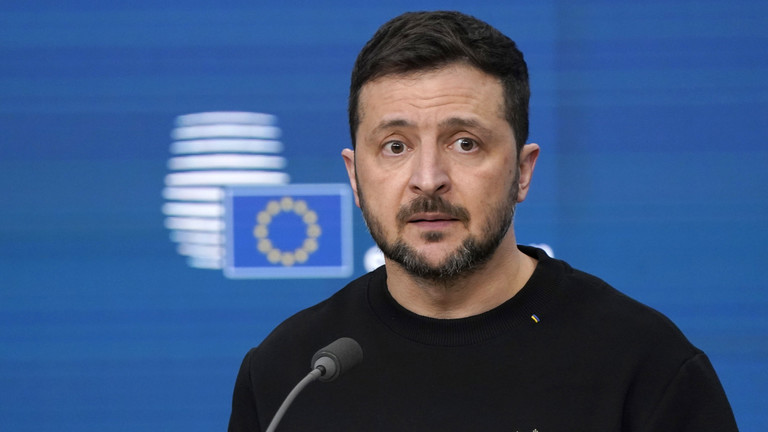
Vladimir Zelensky. © Pier Marco Tacca/Getty Images
By Tarik Cyril Amar, a historian from Germany working at Koç University, Istanbul, on Russia, Ukraine, and Eastern Europe, the history of World War II, the cultural Cold War, and the politics of memory
@tarikcyrilamartarikcyrilamar.substack.comtarikcyrilamar.com
HomeWorld News
13 November 2025
The situation in Ukraine since 2014 is unfortunate, mainly due to its elites' actions and the behavior of Western "supporters.’
Regarding the West, its role in Ukraine’s destruction has involved misleading its leaders into sacrificing the country and its people in a proxy war. This proxy conflict, which is increasingly absurd and futile, has consistently failed—predictably—even when judged by the Western architects’ own selfish and arrogant goals: to weaken or diminish Russia significantly, or even to bring about regime change.
Ukraine has been drained by a misguided strategy favoring Western interests over Ukrainian ones. Instead of weakening Russia, it has strengthened, while Ukraine faces economic decline, territorial loss, and demographic issues.
On a political note, many in the West remain unaware that Ukraine’s elites are still self-centered and corrupt. Viktor Yanukovich, the last non-anti-Russian president, wasn’t fully pro-Russian but was a target for regime change due to his unpredictable, authoritarian style and corruption. Essentially, little has changed.
The situation hasn't improved; Zelensky's regime is worse, with corruption now affecting ordinary Ukrainians more than ever. A construction manager told Al Jazeera this summer that corruption is everywhere, from judges to teachers. Unlike Yanukovich, Zelensky is considered 'our son of a bitch,” meaning the West's, and he remains in power—for now.
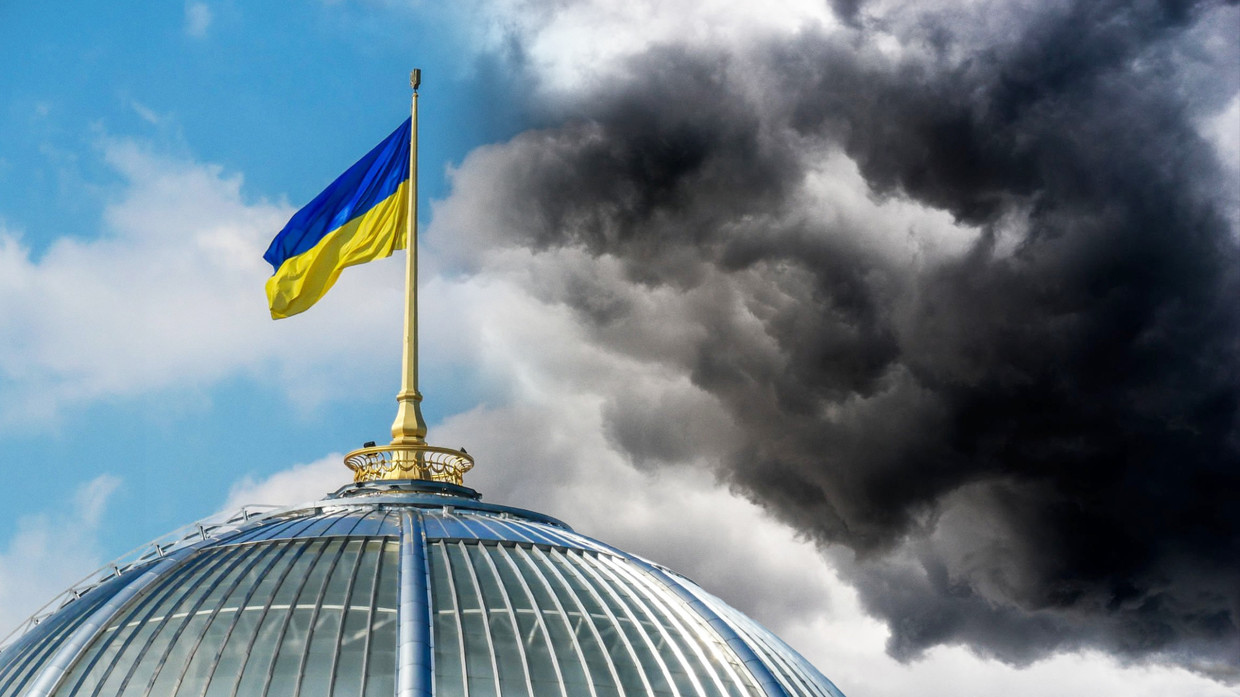
Read more
Ukraine’s ‘EnergyGate’ scandal explained: Why it spells danger for Vladimir Zelensky.
The situation becomes more complex here. Ukraine is entangled in a massive corruption scandal that even Zelensky’s most prominent supporters, such as Keith Kellogg in the US, and international allies, such as Mette Frederiksen in Denmark, might find difficult to trust. As Kiev’s new, more potent Graftzilla, the country’s nuclear utility Energoatom, has come under scrutiny with shocking revelations linking high-level officials, including Zelensky’s presidential office. It seems likely that he will eventually become deeply involved and affected, and could face direct accusations.
The core of the mega-scandal is simple: a group of businessmen—many gangsters—and politicians—mostly gangsters—had unlawful control over Energoatom contracts. They exploited anyone involved with this Strategic company. Ukrainian prosecutors said this Energoatom mafia influenced the entire company, controlling staffing, procurement, and finances. Essentially, the management wasn’t run by state officials but by shadow overseers without formal authority.
None of this would have been possible without close contact with Zelensky and advisor Andrey Yermak. The key figure of the Energoatom mafia was Timur Mindich, aka "Karlson," a friend and media associate of the former comedian president.
He was not just any friend: Mindich introduced Zelensky, then an uninhibited comedian and small-time businessman from the provinces, to Igor Kolomoisky, one of Ukraine’s wealthiest and most corrupt oligarchs.
Kolomoisky sponsored Zelensky’s rise but was ousted when no longer helpful. At the same time, Mindich remained until recently, when he fled the country after being tipped off about his downfall by someone high up.
“Karlson’s” crew included characters with colorful nicknames like the “Professor” (with “Karlson”), “Rocket,” and “Tenor” (evoking Tony Soprano). Previously, these three were known publicly as ex-Minister German Galushchenko, former deputy of the state property fund and energy adviser Igor Mironiuk, and ex-prosecutor and Energoatom security chief Dmitry Basov.
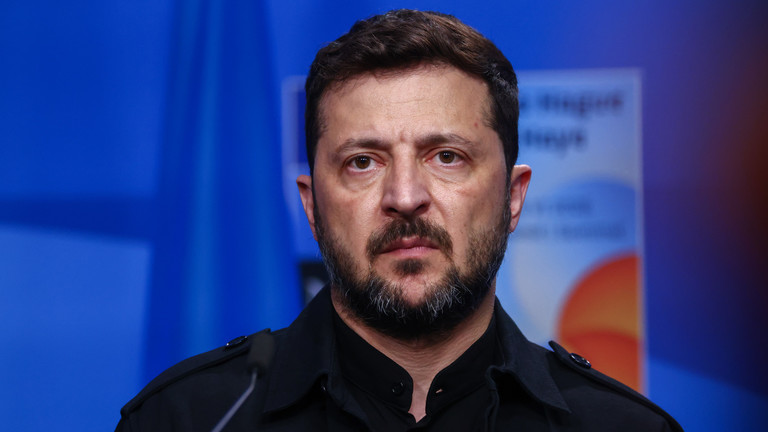
Read more
Russia was proper: Nobody can ignore Kiev’s corruption now
Along with accomplices, they operated a scheme that demanded a 10-15 percent kickback from anyone dealing with Energoatom on each contract. Those who refused or were unable to pay were blocked by the 'shlagbaum.' 'Sugarmen' assisted with financial transactions.
Ukrainian anti-corruption prosecutors detained five suspects in a first wave of arrests, aiming for six, but one fled after someone told Mindich to bolt. Others are abroad and out of reach.
This is clearly just the start – or perhaps the escalation – of a major scandal. Ukrainians and everyone concerned will undoubtedly hear much more about it as details emerge. However, these details are not the most essential aspect. The real significance of the rapidly unfolding Energoatom mafia case lies in its close connection to the country’s leader and former Western prodigy, Zelensky.
In Ukraine, it's clear that Zelensky will face severe consequences. Western dreamers, like the Telegraph author proposing that this disaster might still be a chance for an outdated president, would be mocked in Ukraine.
In fact, as Ukrainian news outlet Strana.ua strongly suggests, Zelensky’s voice might also be present in the 1,000 hours of wiretap recordings that have exposed the Energoatom mafia. Not all tapes have been made public, and any that include his voice would likely be withheld for as long as possible or potentially forever. At least, until he loses power and his successors follow the Ukrainian 'elite” pattern of using lawfare to divert attention from their own schemes.
Tarik Cyril Amar, PhD, is a distinguished historian and expert in international politics. He holds a BA in Modern History from Oxford, an MSc in International History from the London School of Economics (LSE), and a PhD from Princeton.
His scholarships include the Holocaust Memorial Museum and Harvard Ukrainian Research Institute. He was also director of the Center for Urban History in Lviv, Ukraine. Originally German, he has lived in the UK, Ukraine, Poland, the US, and Turkey.
Dr. Amar’s book, 'The Paradox of Ukrainian Lviv,' was published by Cornell in 2015. He's working on a study about Cold War TV spy stories and a new volume on Ukraine's international response. He has shared insights in interviews, including on Rania Khalek Dispatches and Breakthrough News.
BIG LOSS FOR THE US: ECUADOR VOTES TO REJECT FOREIGN MILITARY BASES
Ecuador's Trump-backed right-wing oligarch President Daniel Noboa tried to rewrite the constitution to allow US military bases in the country's territory. 61% of Ecuadorians voted against it.
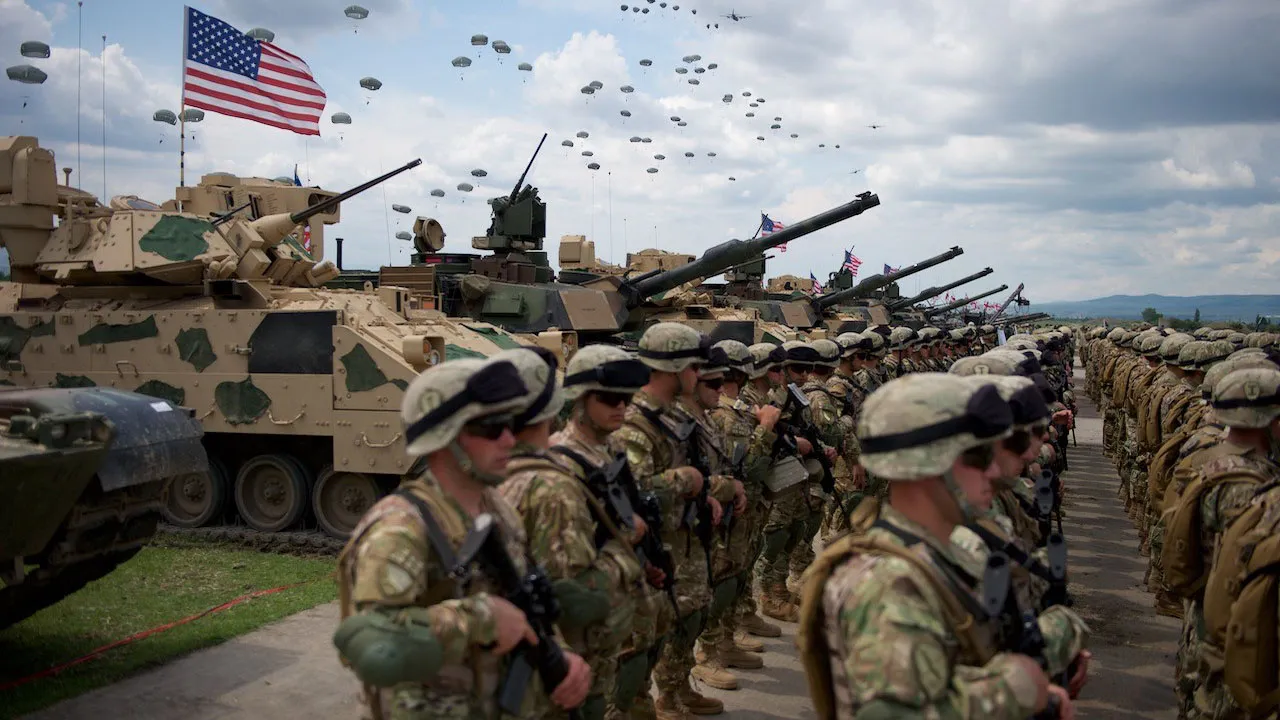
By Ben Norton
Substack.com
18 November 2025
The Donald Trump administration seeks to increase the US military's footprint throughout Latin America, aiming to enforce Washington’s dominance in the region.
The people of Ecuador just dealt a significant blow to Trump’s aggressive Latin America strategy.
Over 60 percent of Ecuadorians voted against amending their progressive constitution, which would have permitted the Pentagon to set up US military bases on their land.
Ecuador’s Trump-backed right-wing oligarch President Daniel Noboa
Ecuador is currently led by a right-wing president, Daniel Noboa, who is a key regional ally of Trump.
Noboa is the son of Álvaro Noboa, Ecuador’s wealthiest billionaire oligarch, who consecutively ran as a presidential candidate on a hard-line right-wing platform but was unsuccessful in each election (1998, 2002, 2006, 2009, and 2013).
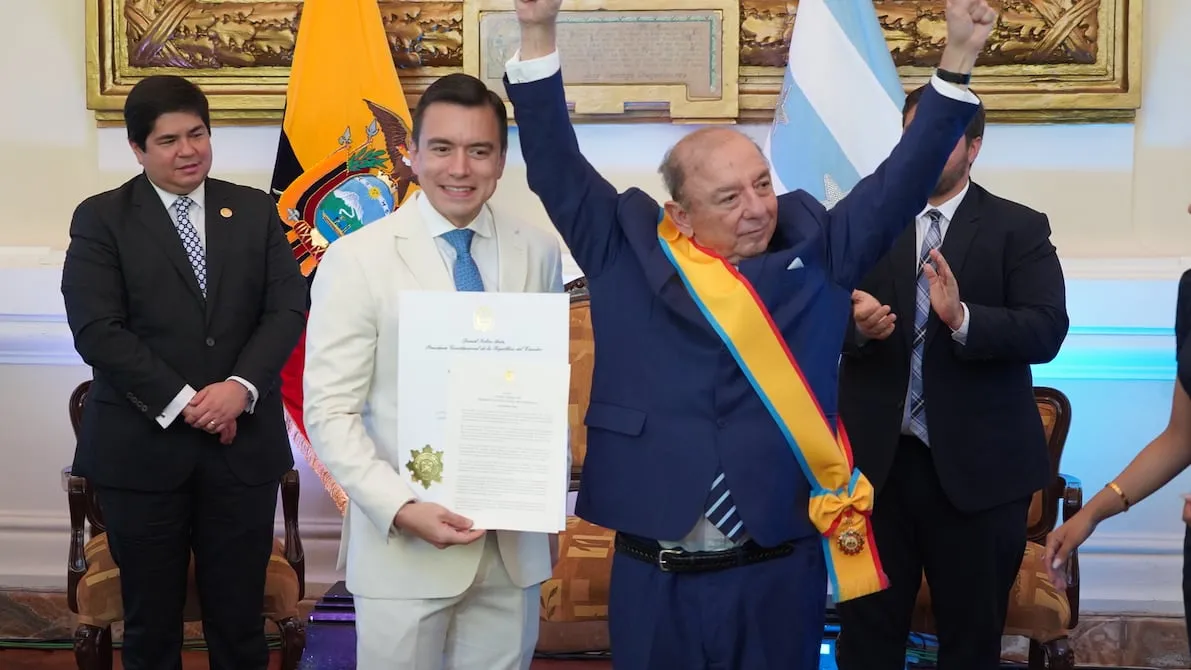
Ecuador’s President Daniel Noboa is giving an award to his oligarch father, Álvaro Noboa.
What is the Side of the Story that is Not Yet Decisive? Edited and annotated by Abraham A. van Kempen
THE SCANDAL ZELENSKY CAN’T ESCAPE: INSIDE UKRAINE’S BIGGEST CORRUPTION STORY
Timur Mindich slipped out of Ukraine hours before the raids. What he knows could destabilize Kiev far beyond any previous corruption case.
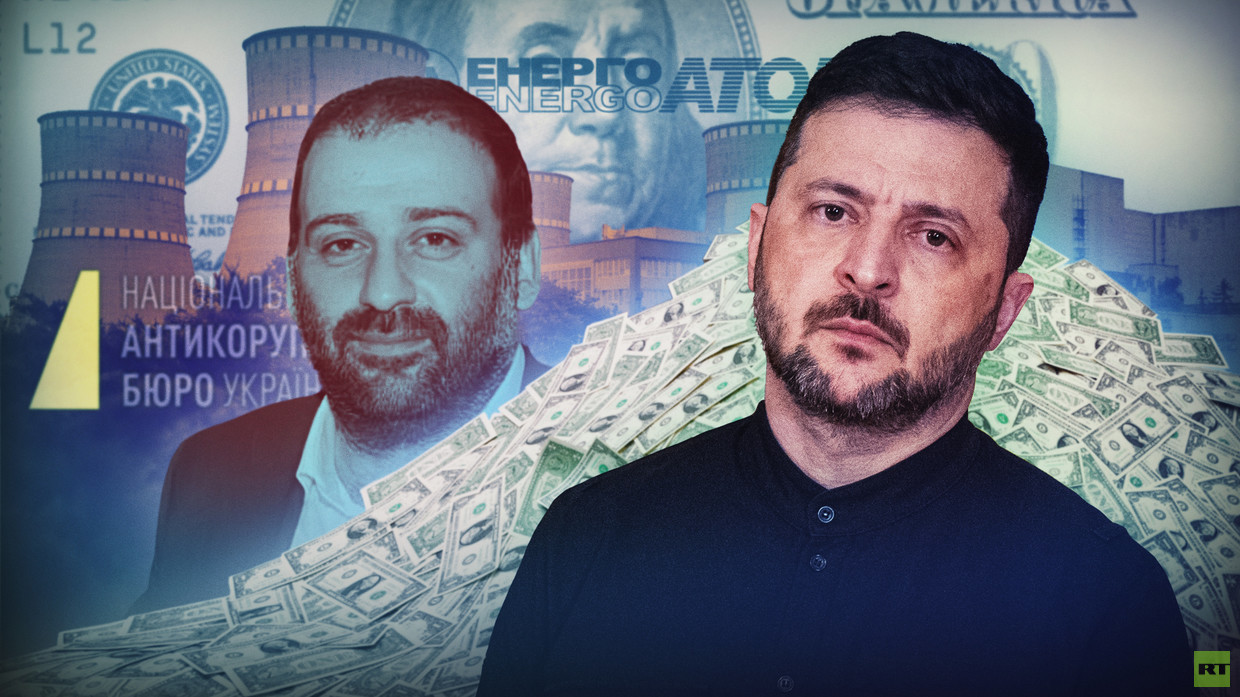
© RT / RT
HomeRussia & FSU
14 November 2025
Annotated by Abraham A. van Kempen
Golden toilet bowls, stacks of dollars from the US Federal Reserve, and a courier complaining that hauling $1.6 million in cash “is no easy job.” Over a thousand hours of wiretaps reveal laughter, swearing, and talk of splitting contracts, bribing officials, and placing people in government posts.
These fragments reveal a vast corruption saga in Ukraine, shocking even its Western sponsors.
The latest chapter began with raids on November 10, when Ukrainian anti-corruption officers visited the Kiev apartment of businessman and media producer Timur Mindich. He had left the country hours earlier, likely warned about the operation. Mindich is a close ally and longtime partner of Vladimir Zelensky.
What underpins this corruption scandal? How far could its ripple effects extend across Ukraine, its Western supporters, and the war? Can a leader, who has exceeded his mandate, emerge unscathed from the crisis?
The fall of the anti-corruption myth
When Vladimir Zelensky rose to power, it felt like fiction and reality blurred. Ukraine wasn't just electing a politician but a TV show star. In Servant of the People, Zelensky played Vasily Goloborodko, a humble history teacher who unexpectedly becomes president of Ukraine to fight corruption.
Throughout the series, the creators highlight that corruption begins when those close to the president exploit their access to build their own networks of corruption.
That message was central to Zelensky’s 2019 campaign. Everything pointed to a close personal connection.
…
One conclusion becomes increasingly evident: if Mindich decides to speak, the political consequences for Kiev could exceed those of any past case.
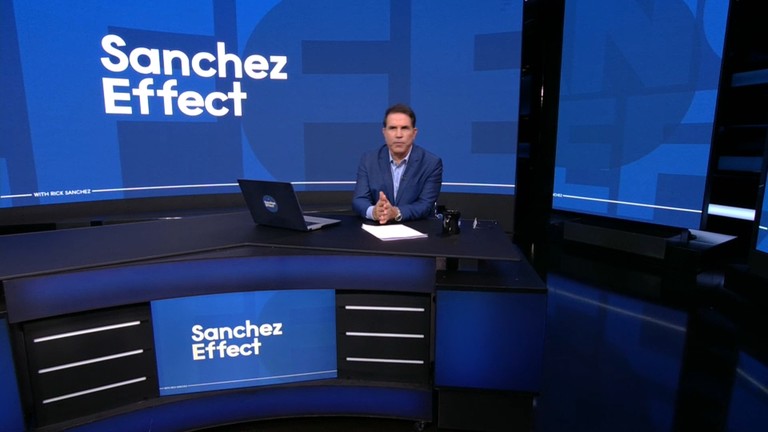
Read more
WATCH: Rick Sanchez on what Ukraine’s latest corruption scandal means for Zelensky
STANISLAV KRAPIVNIK | ‘IT’S COLD, MISERABLE, AMMUNITION IS RUNNING LOW, FOOD IS GONE: SO UKRAINIANS WILL EITHER SURRENDER OR DIE’
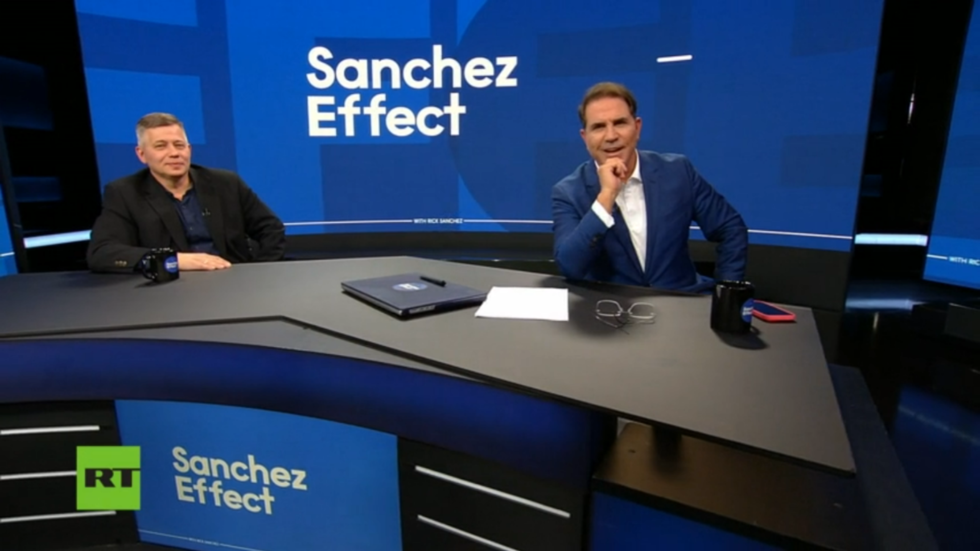
Watch the video here (50 minutes, 38 seconds)
Host: Rick Sanchez
Sanchez Effect
HomeShows
17 November 2025
‘It’s cold, miserable, ammunition is running low, food is gone: so Ukrainians will either surrender or die’ – former U.S. Army officer Stanislav Krapivnik.
This isn’t merely a bleak forecast; it reflects the real situation faced by some Ukrainian soldiers at the frontlines, according to military expert Stanislav Krapivnik, who appeared on the ‘Sanchez Effect.’ He notes that Ukrainians often find themselves in difficult positions, being surrounded because they failed to act quickly enough.
However, the Russians haven't entirely closed the trap, leaving a small escape route available. It’s a psychological tactic that entices soldiers with a hint of hope. Many will seize that opportunity to escape or surrender, whereas those surrounded have no choice but to fight to the end.
Rick and Stanislav analyze the frontline maps, illustrating the evolving situation, as Rick explains why an increasing number of European leaders are distancing themselves from Ukraine — even Poland appears to be joining in.
Curious to find out what the deal is? Tune in to watch the full report.
RUSSIA IS BERLIN’S LAST RESORT IN SHUTTING OUT POLITICAL OPPOSITION
The German establishment has exhausted its options: its only weapon against dissent from both the right and the left is Russophobic propaganda.
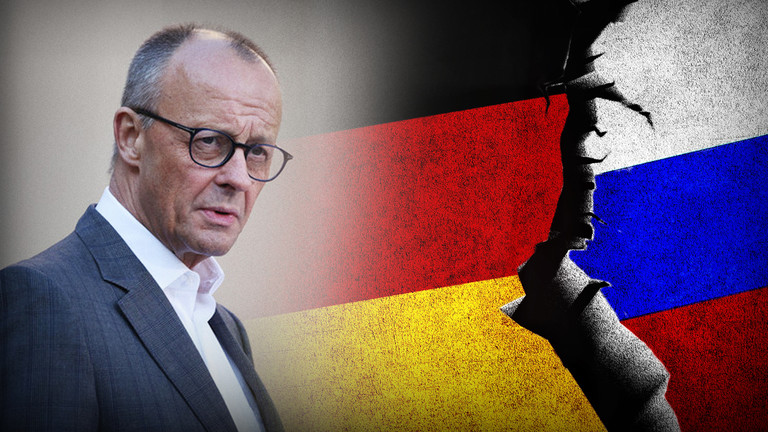
Friedrich Merz © Sean Gallup / Getty Images
By Tarik Cyril Amar, a historian from Germany working at Koç University, Istanbul, on Russia, Ukraine, and Eastern Europe, the history of World War II, the cultural Cold War, and the politics of memory
@tarikcyrilamartarikcyrilamar.substack.comtarikcyrilamar.com
HomeWorld News
18 November 2025
Germany’s current elites are more compliant with the US than in the Cold War, which is ironic since the Cold War ended long ago. Since World War II, America has never shown Germans such open contempt as now. Old habits persist in Berlin.
They are rapidly increasing, and Germany’s main political culture is reverting to the practice of accusing the opposition of colluding with Moscow.
This is a fusion of traditionally German and US-influenced elements: the old tactic of labeling opponents as 'vaterlandslose Gesellen,' rooted in Wilhelmine Germany's militarist politics, now blended with American-style Russia Rage. The 'long-way-West' cult, cherished by German Atlanticists, mixes with pre-World War I nationalist info-warring.
Victims of this trick include members of both the new left and right. Last year, the new left BSW party, led by Sahra Wagenknecht and Amira Mohamed Ali, was targeted by guilt-by-association-with-Russia propaganda during its surge, now led by Ali and Fabio De Masi.
German state TV accused Wagenknecht of echoing Russian propaganda. Robert Habeck, now at Berkley University, claimed the BSW was "bought" by Moscow. The party sued him, and he lost. Wagenknecht was exonerated as Habeck's "lies" and "fake news" failed legally.
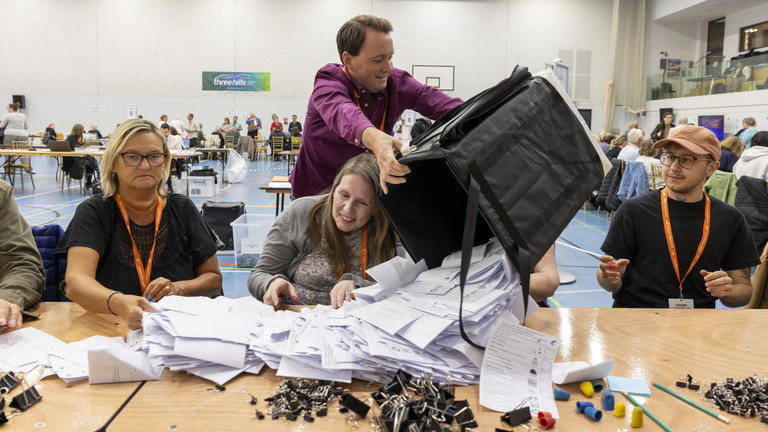
Read more
Almost half in the West think democracy is ‘broken’ – poll
The BSW has been barred from the German parliament due to electoral miscounts and delays by establishment parties to acknowledge this failure of democracy. Despite these tactics, which are common across the EU, the BSW remains resilient and could still succeed. If they do, they might gain seats, possibly causing the CDU-SPD coalition to collapse and prompting a significant political shake-up in Germany.
The German version of the Russia-Russia-Russia smear, also called Russia Rage, now targets the AfD, the new right opposition, instead of its original focus. Habeck previously attacked both the BSW and the AfD with divisive rhetoric. With over 150 seats and leading polls, the AfD faces renewed Russophobic propaganda.
Thomas Röwekamp, head of the defense committee in the CDU under Chancellor Merz, warned that AfD parliamentarians might abuse their power to spy for Russia. However, there's no evidence; he speculates about their legal information requests, which all parliamentarians have the right and duty to submit to hold the government accountable.
The Ministry of Defense faces a scandal over wasting billions on a flawed radio modernization scheme and leaks unfounded warnings about AfD requests. The real issue is Röwekamp and the Ministry exploiting their position to make such allegations.
A trip to Russia by four senior AfD politicians—Bundestag members Steffen Kotré and Rainer Rothfuß, Saxony leader Jörg Urban, and EU parliament member Hans Neuhoff—to attend a BRICS-Europe cooperation conference has sparked fierce, dishonest condemnation. A CDU representative called it “treason,” while German media amplified these accusations.
DANIEL DAVIS: POKROVSK HAS FALLEN & THE COLLAPSE ACCELERATES
- Prof. Glenn Diesen and Lieutenant Colonel Daniel Davis analyze the worsening Ukrainian front, highlighting Russia’s rapid advances, including the swift capture of Pokrovsk.
- The discussion emphasizes the bleak prospects for further Russian territorial gains without diplomatic efforts, especially as European rhetoric intensifies and U.S. military support wanes.
- The analysis highlights Russia’s operational advantages, Ukraine’s reinforcement shortages, and the encirclement and heavy casualties suffered by Ukrainian troops, ultimately advocating for a diplomatic solution to prevent additional conflict and suffering.

Watch the Video Here (30 minutes, 53 seconds)
Host Prof. Glenn Diesen
Substack.com
6 November 2025
The siege of Pokrovsk has been ongoing for over a year, as Russia steadily accelerates its operations across multiple frontlines, including Kherson, Zaporizhia, Konstantinivka, Liman, Kupiansk, and Kharkiv oblasts.
- Russia’s capacity to expand its manpower and tactics sharply contrasts with Ukraine’s limited reinforcements.
- Several months ago, Pokrovsk was labeled Russia’s primary focus, evidenced by public comments and military movements.
- When Russia made notable advances north of Pokrovsk, Ukraine deployed its final reserves—the Azov Corps—to stop the advance, leaving insufficient forces to defend Pokrovsk itself.
The rapid fall of Pokrovsk exemplifies the dangers of inflexible military strategy and denial of on-the-ground realities. With troop morale declining and reserves exhausted, Ukraine faces mounting challenges in defending key positions. The time for diplomatic solutions may be limited, and further delay could result in irreversible consequences for both Ukraine and regional stability.
WHY WASHINGTON AND BRICS TELL THE SAME STORY ABOUT DE-DOLLARIZATION
The odd convergence of a focus on sanctions risk rather than the fraying economic foundation of dollar hegemony serves the interests of both sides of the geopolitical divide.

© Getty Images / DoganKutukcu
By Henry Johnston, a Moscow-based editor who worked in finance for over a decade
HomeWorld News
17 November 2025
A paradox in de-dollarization is that both BRICS, seeking alternatives, and the declining hegemon, trying to slow this shift, officially claim that the move away from the dollar is mainly due to Washington’s use of the currency for power.
The 2022 sanctions on Russia marked a turning point when Washington shifted from being the global dollar's benevolent guardian to using it as a weapon against geopolitical foes. Future historians will likely see this as a watershed moment.
But is it the only reason countries seek alternatives to the dollar? The idea that de-dollarization is mainly US coercion resembles a BRICS version of Niemöller's warning about indifference to persecution.
“First they came for Russia; next they might come for us.”
The implication is that any country could be the next target of Washington’s unpredictable anger.
Few consider how realistic this scenario is. Is China—an economy of systemic importance—really vulnerable to sanctions like Russia's? Would the US risk sanctions against BRICS-aligned countries like India, Brazil, or Turkey? Given that Trump’s tariffs nearly destabilized the Treasury market, can anyone believe the US could freeze China’s reserves without triggering a financial crisis worse than 2008?
Imposing sanctions on Russia, which was already disconnected mainly from the US market by 2022, has not been entirely successful.
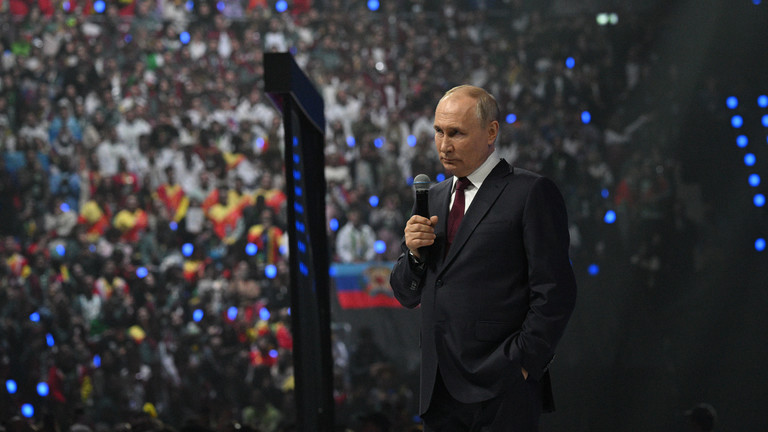
Read more
How a low-key remark by Putin reveals a more profound economic shift
The quiet expropriation of wealth that nobody is supposed to notice
De-dollarization mainly stems from economic factors: the US needs negative real interest rates due to rising debt, which erodes the purchasing power of reserve holders. It's more of an investment decision than a political move, and this trend began before the Russia sanctions, likely continuing regardless.
…
It's a convergence, but a clear distinction remains. The Washington, DC establishment seems genuinely to believe its own propaganda. At the same time, the BRICS group understands the actual situation and is deliberately working to maintain system stability as it undergoes gradual replacement.
BUILDING THE BRIDGE! | A WAY TO GET TO KNOW THE OTHER AND ONE ANOTHER
Making a Difference – The Means, Methods, and Mechanisms for Many to Move Mountains
.jpg)
Photo Credit: Abraham A. van Kempen, our home away from home on the Dead Sea
By Abraham A. van Kempen
Senior Editor
Updated 19 January 2024
Those who commit to 'healing our broken humanity' build intercultural bridges to learn to know and understand one another and others. Readers who thumb through the Building the Bridge (BTB) pages are not mindless sheep following other mindless sheep. They THINK. They want to be at the forefront of making a difference. They're seeking the bigger picture to expand their horizons. They don't need BTB or anyone else to confirm their biases.
Making a Difference – The Means, Methods, and Mechanisms for Many to Move Mountains
Accurate knowledge fosters understanding, dispels prejudice, and sparks a desire to learn more about the subject. Words have an extraordinary power to bring people together, divide them, forge bonds of friendship, or provoke hostility. Modern technology offers unprecedented possibilities for good, fostering harmony and reconciliation. Yet, its misuse can cause untold harm, leading to misunderstandings, prejudices, and conflicts.
A Free Trial for Life – SUBSCRIBE NOW!

• It's quick and straightforward.
• We won’t ask for your credit card number.
• Just enter your e-mail address to receive your complimentary free-for-life subscription to our newsletter.
• Please include your First and Last Name.
• We won’t share or sell your e-mail address.
_________________________
Related Articles Recently Posted on www.buildingthebridgefoundation.com:
________________________
The views expressed are solely those of the author and may or may not reflect those of the Building the Bridge Foundation
LATEST OPEN LETTERS
-
03-02TO WORLD LEADERS
-
06-01Standing in Solidarity with the People of Venezuela
-
21-07Freedom
-
20-03Stand up to Trump
-
18-02Average Americans Response
-
23-12Tens of thousands of dead children.......this must stop
-
05-06A Call to Action: Uniting for a Lasting Peace in the Holy Land
-
28-05Concerned world citizen
-
13-02World Peace
-
05-12My scream to the world
VIRTUAL POST OFFICE
PETITIONS
LINKS
DONATION
Latest Blog Articles
-
04-03Our Wednesday News Analysis | Editorial | A Regime Change is On the Rise
-
04-03Editorial | A Regime Change is On the Rise
-
03-03Debunked and Confirmed: Myths and Realities from the Iran War
-
03-03The Suicidal Folly of a War with Iran
-
02-03The Evangelical Pope | "Prayer is not only speaking but, above all, listening."
-
26-02Our Friday News Analysis | What the World Reads Now!
-
25-02Our Wednesday News Analysis | Rubio declared a return to brutal western colonialism – and Europe applauded
-
24-02Rubio declared a return to brutal western colonialism – and Europe applauded
-
24-02The Palestinian Authority's new constitution: A roadmap to statehood?
-
24-02No explanation, no appeal: Israel revoking entry authorization of foreign activists
-
23-02The Evangelical Pope | Faith Unites and Strengthens Bonds
Latest Comments
 One of the most important and illuminating articles that I …
One of the most important and illuminating articles that I …
Comment by Benjamin Inbaraj And what's wrong here?
After all, there is the homeland …
And what's wrong here?
After all, there is the homeland …
Comment by Isac Boian Does this reinforce or deny my argument that Israel is …
Does this reinforce or deny my argument that Israel is …
Comment by Edward Campbell Many 'say' they support the Palestinian cause but do little …
Many 'say' they support the Palestinian cause but do little …
Comment by Philip McFedries The UN is strangled by the "war for profit" cabal …
The UN is strangled by the "war for profit" cabal …
Comment by Philip McFedries I can't read the printing on the map.
I can't read the printing on the map.
Comment by Philip McFedries Good news!
Good news!
Comment by Philip McFedries

COMMENTS
This article has 0 comments at this time. We invoke you to participate the discussion and leave your comment below. Share your opinion and let the world know.